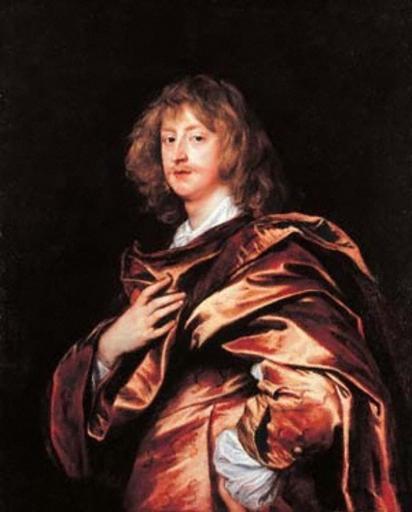MAKE A MEME
View Large Image

| View Original: | George_Digby,_2nd_Earl_of_Bristol.jpg (300x373) | |||
| Download: | Original | Medium | Small | Thumb |
| Courtesy of: | www.flickr.com | More Like This | ||
| Keywords: people indoor George Digby, 2nd Earl of Bristol (22 February 1612 – 20 May 1677), was an English politician. He was born in Madrid, the eldest son of John Digby, 1st Earl of Bristol and his wife Beatrice Walcott. Bristol was one of the most striking and conspicuous figures of his time, a man of brilliant abilities, a great orator, one who distinguished himself without effort in any sphere of activity he chose to enter, but whose natural gifts were marred by a restless ambition and instability of character fatal to real greatness. Clarendon describes him as "the only man I ever knew of such incomparable parts that was none the wiser for any experience or misfortune that befell him," and records his extra-ordinary facility in making friends and making enemies. Horace Walpole characterized him in a series of his smartest antitheses as "a singular person whose life was one contradiction." "He wrote against popery and embraced it; he was a zealous opposer of the court and a sacrifice for it; was conscientiously converted in the midst of his prosecution of Lord Strafford and was most unconscientiously a persecutor of Lord Clarendon. With great parts, he always hurt himself and his friends; with romantic bravery, he was always an unsuccessful commander. He spoke for the Test Act, though a Roman Catholic; and addicted him-self to astrology on the birthday of true philosophy." Besides his youthful correspondence with Sir Kenelm Digby on the subject of religion, already mentioned, he was the author of an Apology (1643) [Thomason Tracts, E. 34 (32)], justifying his support of the king's cause; of a comedy, Elvira (1667) [Printed in R. Dodsley's Select Collection of Old English Plays (Hazlitt, 1876), vol. xv], and of Worse and Worse, an adaptation from the Spanish, acted but not printed. Other writings are also ascribed to him, including the authorship with Sir Samuel Tuke of The Adventures of Five Hours (1663). His eloquent and pointed speeches, many of which were printed, are included in the article in the Biog. Brit. and among the Thomason Tracts; see also the general catalogue in the British Museum. The catalogue of his library was published in 1680. Bristol married Lady Anne Russell, a daughter of Francis Russell, 4th Earl of Bedford and Catherine Brydges. They were parents to four children: John Digby, 3rd Earl of Bristol (c. 1635 - 18 September 1698). Died without issue, the peerage became extinct. Francis Digby (d. 1672). Died unmarried. Diana Digby. Married Baron Moll in Flanders. Anne Digby (d. 26 April 1715). Married Robert Spencer, 2nd Earl of Sunderland. George Digby, 2nd Earl of Bristol (22 February 1612 – 20 May 1677), was an English politician. He was born in Madrid, the eldest son of John Digby, 1st Earl of Bristol and his wife Beatrice Walcott. Bristol was one of the most striking and conspicuous figures of his time, a man of brilliant abilities, a great orator, one who distinguished himself without effort in any sphere of activity he chose to enter, but whose natural gifts were marred by a restless ambition and instability of character fatal to real greatness. Clarendon describes him as "the only man I ever knew of such incomparable parts that was none the wiser for any experience or misfortune that befell him," and records his extra-ordinary facility in making friends and making enemies. Horace Walpole characterized him in a series of his smartest antitheses as "a singular person whose life was one contradiction." "He wrote against popery and embraced it; he was a zealous opposer of the court and a sacrifice for it; was conscientiously converted in the midst of his prosecution of Lord Strafford and was most unconscientiously a persecutor of Lord Clarendon. With great parts, he always hurt himself and his friends; with romantic bravery, he was always an unsuccessful commander. He spoke for the Test Act, though a Roman Catholic; and addicted him-self to astrology on the birthday of true philosophy." Besides his youthful correspondence with Sir Kenelm Digby on the subject of religion, already mentioned, he was the author of an Apology (1643) [Thomason Tracts, E. 34 (32)], justifying his support of the king's cause; of a comedy, Elvira (1667) [Printed in R. Dodsley's Select Collection of Old English Plays (Hazlitt, 1876), vol. xv], and of Worse and Worse, an adaptation from the Spanish, acted but not printed. Other writings are also ascribed to him, including the authorship with Sir Samuel Tuke of The Adventures of Five Hours (1663). His eloquent and pointed speeches, many of which were printed, are included in the article in the Biog. Brit. and among the Thomason Tracts; see also the general catalogue in the British Museum. The catalogue of his library was published in 1680. Bristol married Lady Anne Russell, a daughter of Francis Russell, 4th Earl of Bedford and Catherine Brydges. They were parents to four children: John Digby, 3rd Earl of Bristol (c. 1635 - 18 September 1698). Died without issue, the peerage became extinct. Francis Digby (d. 1672). Died unmarried. Diana Digby. Married Baron Moll in Flanders. Anne Digby (d. 26 April 1715). Married Robert Spencer, 2nd Earl of Sunderland. | ||||